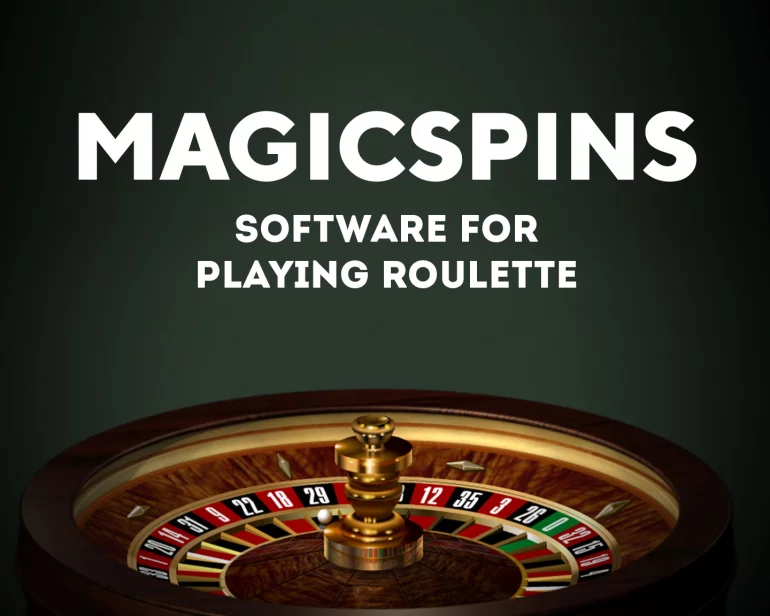In this article, we will talk about a program for roulette players called MagicSpins. The technique is interesting in itself.
Describing it isn't easy. Not everyone can understand the terms used by software creators. They confessed:
In the project team, there are no mathematicians who could evaluate the methodology in terms of science.
But let's start in order.
Who Developed MagicSpins
MagicSpins was created within the project haosa.net, uniting enthusiasts of roulette. Their goal is clear - to create a program that can win at roulette. Even though it seems impossible for us (Casinoz), a creative approach makes us respect it. Ultimately, much of what was once thought improbable later became routine. Who knows, maybe they are destined to win.

However, the results are later.
How MagicSpins Works
As mentioned above, understanding the principle of MagicSpins is incredibly difficult. Famous writer Kurt Vonnegut said, "If a scientist can not explain to the eight-year-old boy what he is doing, he is a cheater." Arguments from MagicSpins developers are not accessible to everyone with a higher education because they are full of terms such as "tolerated," "pre-history," "random maps," and "assignable pair." In explaining these concepts, they are piling them up, and it seems that the simple things are presented as complex.
The program generally is about the following: "Achieving tolerances, using the method of random mappings." Is all clear? My knowledge of mathematics is not deep enough to refute such a theory. But the creators also do not claim to be considered experts.
This thread ends with a beautiful phrase:
The team does not have mathematicians who could evaluate the technique in terms of science. Moreover, there is an assumption that the classical theory of probability will not leave a stone unturned in the above "manipulation". But it is possible that this system can work without mathematicians, no offense to them. Whenever it was not clear, you can approach the question empirically, that is practically. These experiments are easy after downloading the demo of MagicSpins ...
Simply put, do not bother with it. Download the program and test. Here's a demo version.
And here begins the most important thing.
How to Test the Program
Perhaps you have decided: "And you never know!" Suddenly, the guys managed to bungle something that did not exist. Ultimately, a demo version is available for a small fee, allowing you to try it out.
Yes, you heard right, the demo version of the program is for sale, which looks quite ridiculous, if not suspicious.
We did not test MagicSpins (screenshot taken from open sources). The reasoning seemed to us a complete profanation (although perhaps we are not smart enough), and the uncertainty of the developers only reinforced that thought.
We still believe that predicting the results of the random number generator is impossible.
Regarding the practical test, as one of the MagicSpins developers stated on their forum site, fewer than twenty commercial versions and approximately three hundred demonstrations were sold in five years; however, almost nobody uses an active program. This is the best proof of its low efficiency or even futility. And reviews on online forums, not considering the comments of interested persons, are hardly the opposite.
You can find a more detailed program description on the official site. On one of the well-known forums, you can find long debates between developers of MagicSpins with experienced players who are better at math than we are.
| Name | Soft | RTP | |||
|
|
98.65% |
Play
T&C applies, 18+
|
|||
|
|
98.65% |
Play
T&C applies, 18+
|
|||
|
|
98.65% |
Play
T&C applies, 18+
|
|||
|
|
98.65% |
Play
T&C applies, 18+
|
|||
|
|
98.65% |
Play
T&C applies, 18+
|
|||
|
|
98.6% |
Play
T&C applies, 18+
|
|||
|
|
98.05% | ||||
|
|
97.3% |
Play
T&C applies, 18+
|
|||
|
|
97.3% |
Play
T&C applies, 18+
|
|||
|
|
97.3% |
Play
T&C applies, 18+
|
Conclusion
Once again, our team does not have professional mathematicians, so we can not claim that MagicSpins is based on false assumptions. We have not tested the program. We do not even want to pay and spend time trying questionable software. And developers' arguments seem unconvincing to us, to put it mildly, to believe them.
We firmly believe that the product, based on the theory, still requires confirmation and may not be sold, especially under the guise of enthusiasm and a desire to build a team of like-minded people. It's even more foolish to borrow money for the demo.
In short, we can not recommend MagicSpins. The choice is yours. We will be grateful for any e feedback from everyone who used this program and won at roulette with it.
For more information about betting systems and attempts to overcome them using the casino advantage, read this article by Eliot Jacobson, Professor of Mathematics.
























